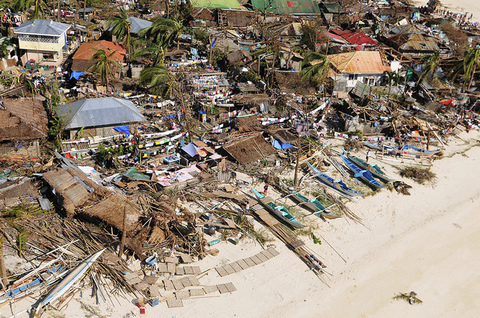It's time for new Canadians to vote for the environment

In the Philippines, recent devastating typhoons have made human vulnerability in the face of climate change (and the extreme weather it produces) a front-and-centre issue. (Credit: Mans Unides via Flickr)
Since my family immigrated to Canada from Asia three decades ago, we have been through a good number of elections. There has never been a shortage of new Canadian candidates coming to our community pitching ethnicity as a top reason to give them our vote. The logic is that new Canadian voters should vote for candidates who share the same roots.
If voting for ethnicity is the top ask from new Canadian candidates, voting for the economy is second on the list. The implied message is that a strong economy trumps all, even a healthy environment. This idea could not be more wrong. That is why I will not give away my vote for purely ethnic or economic reasons this year. I will look for the candidate with a strong environmental platform because, in the long term, voting for the environment is the only logical thing to do.
According to Citizenship and Immigration Canada, the three countries from which most immigrants to Canada came in 2013 were China (34,126) India (33,086) and the Philippines (29,539). These countries are also facing some of the toughest environmental and climate challenges in the world.
Take China. Along with the well-reported air pollution in cities like Beijing and Shanghai, decades of over-industrialization, deforestation and intensive agriculture have led to a long list of environmental issues, including desertification and groundwater contamination. According to Reuters, China's groundwater supplies irrigation to 40 per cent of the country's farmland, but an estimated 90 per cent of this water is polluted.
In India, environmental degradation is equally worrying. The Yale Environmental Performance Index and India's Central Pollution Control Board have highlighted the air pollution problem in India. In 2010, the average concentration of harmful airborne particles in 190 Indian cities was six times the World Health Organization safety level and double India's own national standards. The concentration in Delhi alone is about 13 times higher than the WHO guideline.
As for the Philippines, recent devastating typhoons have made human vulnerability in the face of climate change (and the extreme weather it produces) a front-and-centre issue. Extreme climate-related weather events are threatening the security of countries like the Philippines.
According to a 2014 Focus Canada Poll jointly conducted by the David Suzuki Foundation and Environics Institute, 60 per cent Canadians now believe climate change is real and is primarily caused by human activity. The question is whether or not this sentiment will be translated into votes for the environment.
Polls by Abacus Data show the majority of Canadian voters lean toward healthcare and job creation as their top two voting priorities. A Nanos Research study found 72 per cent of Canadians listed the economy and jobs as key issues in determining their vote. A lot has happened since these numbers were released. World oil prices have collapsed, leading to the loss of Canadian jobs. Drought has led to massive forest fires in regions historically known for an abundance of water. Voters are waking up to the idea that an unstable environment means an unstable economy.
After this long hot summer in British Columbia, my family and I will no longer take the environment -- one of the main drivers behind our decision to come to Canada -- for granted. When we breathe the fresh air and drink clean water from our taps, we must recognize these things are the result of generations of hard work.
As our population and industrial activities increase, more pressure is placed on the environment that sustains us. We must elect leaders who will ensure that development does not come at the expense of nature. As people who have survived extreme poor air quality daily and contaminated food sources, new Canadians should be the first to call for solutions to environmental degradation and climate change. Many pundits tell us this election is all about the economy, stability and jobs. Exercising our democratic rights to vote for a better environment is the first step because we have now learned that without a vibrant environment, our economy, stability and jobs suffer.
YES, I'm voting on October 19.
Hey! Want more DSF? Join David Suzuki on Facebook
David Suzuki's Blog
- David Suzuki's profile
- 247 followers



